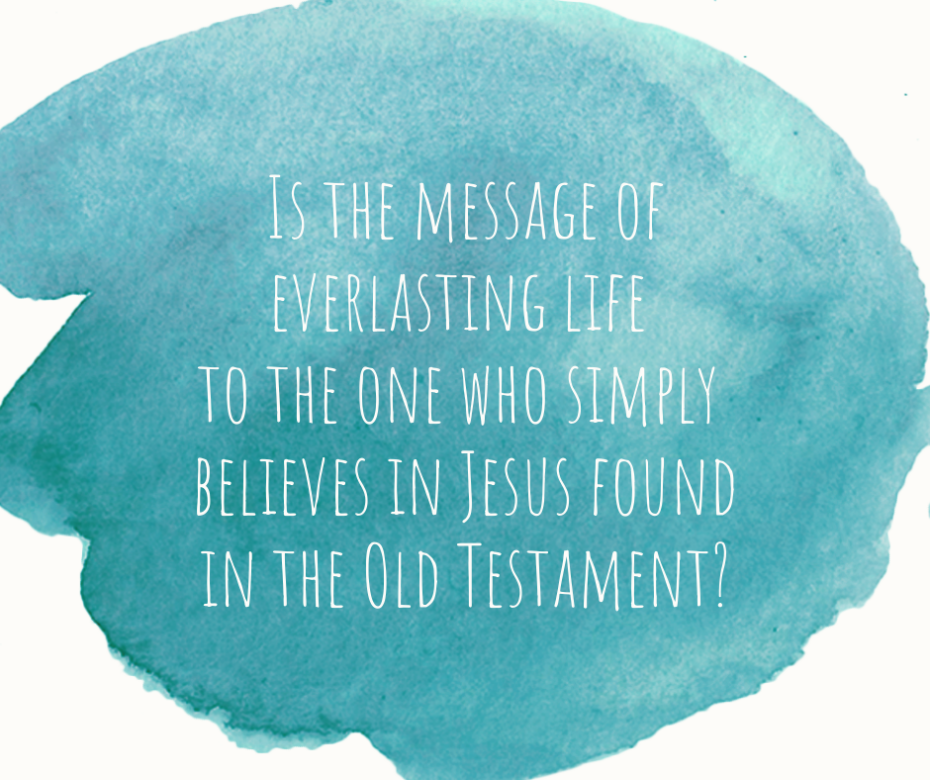I received a question about what people in the OT had to believe in order to be saved:
Hi. You said that in the Old Testament people had to believe in the coming Messiah to be saved. Is the message of everlasting life to the one who simply believes in the Old Testament? And where does it say in the Old Testament that the Christ would give everlasting life?
We have published various articles and blogs about this in the past. See, for example, this 1994 article by Zane Hodges on the salvation of King Saul, this 1994 article by Zane Hodges on the salvation of Samuel, and this 2001 article by Sidney Dyer. You might also see my recent blog entitled, “The Advent of the New Birth,” which should be published by the time you read this blog.
“Is the message of everlasting life to the one who simply believes [in the Messiah] in the Old Testament?” Yes, it is. But not in those words. And that message was preached as much or more than it was recorded in the OT. Remember that there were many prophets in Israel up until around 400 BC. Those prophets not only wrote books of the Bible, they also preached orally. Much of what they preached is not found in the OT.
Keep in mind that John the Baptist and the Lord Jesus were OT prophets. We know that very little of what Jesus said is recorded in the Gospels (John 21:25). The same is surely true of the words of John the Baptist.
In order to be justified/born again, OT people had to believe in the coming Messiah for their eternal destiny. We know this from the testimony of the OT and the NT, and from theology and logic.
First, the OT tells us so in Gen 15:6. It also implies that in Gen 3:15; Exod 3:1-6; Job 19:25-26; Isa 52:13–53:12; Dan 12:2-3; Micah 5:2; Zech 9:9-10.
Second, the NT tells us so in John 8:56; Heb 11:10, 26; Jude 14-15. Of course, the entire Gospel of John tells us how people were born again during the ministry of Jesus, which was still during the OT era. The Church was not born until Acts 2. Yet Nicodemus (John 3:1-18), the woman at the well (John 4:1-26), the Apostles (John 6:69), Martha (John 11:25-28) and many others were born again by faith in Messiah during Jesus’ ministry (compare John 20:30-31).
Third, theology and logic confirm it. If people were not born again in the OT, then the new birth did not begin until Acts 2. If that were so, then Jesus and John the Baptist misled people. They both said that whoever believes in Jesus had everlasting life right then (see e.g., John 3:14-18 and John 3:36), not years later when the Church was born.
If people in the OT did not need to believe in the Messiah for everlasting life, then what did they need to believe in? If a general faith in the existence of God was all that was required, then how is it fair that people today can’t be saved in that same way? Why two different saving messages? Imagine someone who died in AD 32 and went to heaven because he believed in God, though he rejected Jesus as Messiah. But his brother died in AD 34, holding the same beliefs, yet he was sent to Hades because he didn’t meet the new content of saving faith.
I’ve never understood how people think that two different ways of salvation makes sense. If two, why not three or more ways of salvation? And if three or more over the course of history, why not three or more ways of salvation today?
We open Pandora’s box when we think that people were saved in the OT by believing some message other than the promise of life for all who believe in the Christ.
So, where does the OT say that He gives everlasting life to the one who believes in Him? Daniel 12:2 is one, though it only implies that everlasting life is for the one who believes in Messiah. Other OT texts, though they do not mention everlasting life, clearly indicate that believers in Messiah will spend eternity with Him in His kingdom in resurrected bodies (e.g., Gen 15:6; Job 19:25-26; Dan 12:2-3).
But there are many OT texts that clearly say this, in the very words of the Lord Jesus Himself. John 3:14-18 plainly says that whoever believes in Jesus has everlasting life and will never perish. So do John 5:24; 6:35, 47; and 11:25-27. While those books appear in the NT, they report on what Jesus said during the OT era. One of my OT profs, Dr. Allen Ross, told me one time, “You know, Bob, the four Gospels should be taught by the OT Department professors because those books are still OT. The NT does not begin until Acts 2.”
It should be noted that the Gospel of John cuts both ways. That is, it reports about the OT era, so it does tell us how OT people were born again. But it was written after the birth of the Church to tell people during the NT era how they can be born again. John’s Gospel shows that the message that saved OT people is that same message that saves NT people.
If that does not fit your paradigm, I suggest you prayerfully read John’s Gospel again. Ask God to show you whether that was the message by which people were born again by believing during the ministry of Jesus. Ask Him to show you as well whether that is the message by which people are born again by believing today.
Thanks for the great questions.


